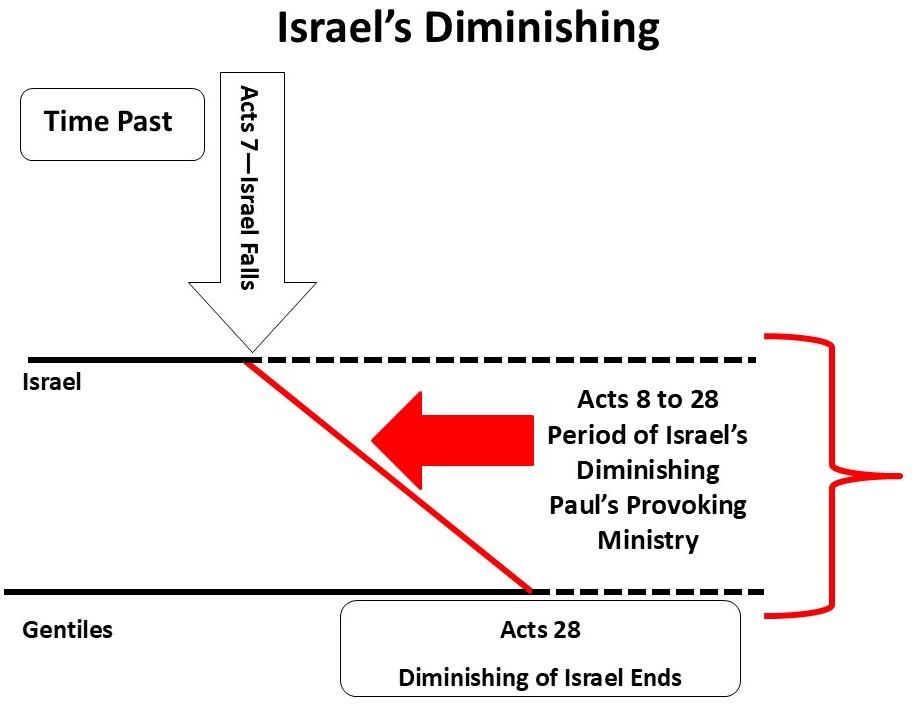
Few events in biblical history are as pivotal and yet misunderstood as Israel’s fall and diminishing. This profound shift in God’s dealings with humanity marks a crucial turning point in the Biblical narrative, one that continues to shape our understanding of faith and salvation today.
To truly grasp this concept, we must first recognize the distinction between two key time periods in Scripture: “time past” and “but now.” In “time past,” God dealt with the world through a clear distinction between Israel and the Gentiles. Israel held a privileged position, while Gentiles were “without hope and without God in the world” (Ephesians 2:12). However, a dramatic change occurred, ushering in the “but now” period we currently live in.
This transformation hinges on a specific event – the fall of Israel. But what exactly does this fall entail? Romans 11:11 provides a fascinating insight: “I say then, have they stumbled that they should fall? God forbid: but rather through their fall salvation is come unto the Gentiles, for to provoke them to jealousy.”
At first glance, this verse might seem contradictory. How can Israel both not fall and fall at the same time? The key lies in understanding two different Greek words used here, both translated as “fall” in English. The first refers to a permanent, irrecoverable fall, which Paul emphatically denies with “God forbid.” The second indicates a specific act of sin or departure from truth.
In essence, Israel did fall, but not in a way that God has permanently rejected them. Rather, their fall was a specific act of unbelief that opened the door for salvation to go directly to the Gentiles. This fall occurred in Acts 7 with the stoning of Stephen, filled with the Holy Spirit, marking the third and final rejection of God’s witness to Israel – first the Father through the prophets, then the Son in His earthly ministry, and finally the Holy Spirit in the early Acts period.
This fall of Israel ushered in a period of “diminishing” for the nation. As we read through the book of Acts, we see a gradual shift in focus from Israel to the Gentiles, culminating with the Apostle Paul’s ministry. Paul, once a persecutor of the Jewish kingdom church, becomes the “apostle to the Gentiles,” tasked with a unique mission to provoke Israel to jealousy through his ministry to non-Jews.
In the course of biblical history, few events are as pivotal and yet misunderstood as the fall and diminishing of Israel. This profound shift in God’s dealings with humanity marks a crucial turning point in the Biblical narrative, one that continues to shape our understanding of Scripture and salvation today.
Paul’s conversion and calling are central to this new era of God’s dealings with humanity. On the road to Damascus, he encounters the risen Christ in a blinding light, receiving a direct commission from the Lord (Acts 26:15-18). This personal revelation is crucial – Paul emphasizes in Galatians 1 that he received his gospel not from any man, but “by the revelation of Jesus Christ” (Galatians 1:12).
Following his conversion, Paul spent time in Arabia before returning to Damascus (Galatians 1:17). This period, often overlooked, is likely when he received further instruction directly from Christ, preparing him for his unique apostleship. It’s a powerful reminder that God often works in hidden ways, shaping His servants in solitude before launching them into public ministry (Moses also comes to mind.).
The implications of Israel’s fall and diminishing are profound. It marks the beginning of what Paul calls the “dispensation of grace” – a time when salvation is offered freely to all, Jew and Gentile alike, based solely on faith in Christ’s finished work. The middle wall of partition between Jew and Gentile has been broken down, and God is forming one new man – the body of Christ – from both groups (Ephesians 2:14-16).
However, it’s crucial to understand that God is not finished with Israel. Romans 11:26 declares, “And so all Israel shall be saved.” There will come a day when God will fulfill His prophetic promises to the nation. The current age of Gentile grace is a parenthesis in God’s overall plan, designed to provoke Israel to jealousy.
As we reflect on these truths, several key lessons emerge:
- God’s Ways Are Higher Than Our Ways. The fall of Israel, while a tragedy of spiritual unbelief, opened the door for the salvation of the Gentiles apart from Israel – a beautiful example of how God can bring good out of even the darkest situations.
- Grace Is The Hallmark Of The Current Dispensation. We live in a unique time when salvation is freely offered to all, regardless of nationality or background. This should fuel our gratitude and our urgency in sharing the gospel.
- God Is Faithful To His promises. Though Israel has been set aside for a time, God has not forgotten His covenant with them. This reassures us of His faithfulness to all His promises.
- Divine Revelation Is The Foundation Of True Ministry. Just as Paul received his gospel directly from Christ, we too must root our understanding and teaching in the revealed Word of God, not human tradition, wisdom, or experience.
- God’s Plan Is Bigger Than We Often Realize. The story of Israel’s fall and diminishing reminds us that God is working out His eternal purpose (Ephesians 3:11), for His glory and He centers all things in heaven and earth in Christ (Ephesians 1:10).
As we ponder these profound truths, let us be stirred to a deeper appreciation of God’s wisdom and grace. May we, like Paul, be faithful to the calling God has placed on our lives, to be ambassadors for Jesus Christ, and to fulfill the ministry of reconciliation (II Corinthians 5:20) as we share the gospel of the grace of God.
Pastor Bryan Ross
Grace Life Bible Church
Grand Rapids, MI
January 10, 2025
Resources For Further Study
15) The Fall & Diminishing Of Israel (YouTube Message)
